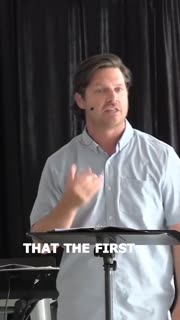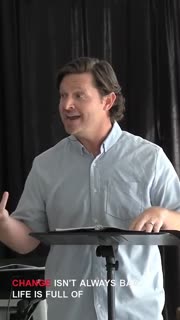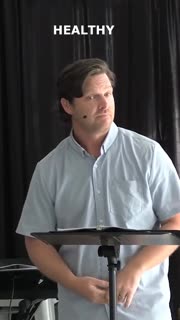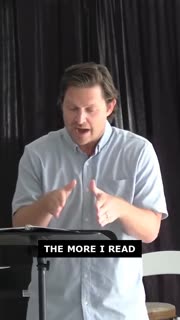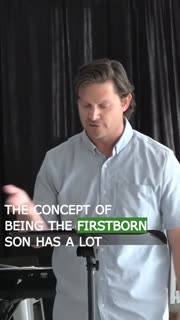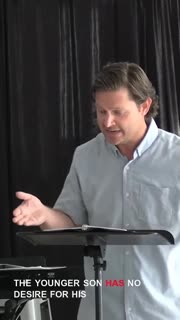Embracing Our Identity as Beloved Children of God
Summary
### Summary
Welcome to Risen Church! As we transition from summer to fall, it's a time of reflection and planning for the future of our church. I'm grateful for Rich Lee, who has been delivering powerful messages over the past few weeks. Today, I want to share my excitement and gratitude for what God is doing in our community. We are launching community groups soon, and I encourage everyone to participate in our upcoming Weekender event to learn more about our church's vision and values.
This season of transition can be overwhelming, but it's also an opportunity for growth. Change is not inherently bad; it often brings new challenges and expectations. Stress can be a sign of growth, and God calls us to rest and trust in Him during these times. The first day of the week is Sunday, a day to behold what matters most and start with rest, just as the ancient Israelites did.
Today, we begin a mini-series on sonship, focusing on the parable of the prodigal son from Luke 15. This parable is not just about salvation but also about our identity as sons and daughters of God. The younger son represents those who struggle to receive and walk in their sonship. He falls into two temptations: believing that God is not enough and that he is not enough. These temptations are common to all of us.
The younger son asks for his inheritance while his father is still alive, essentially saying that he values the father's gifts more than the relationship. He squanders his inheritance in reckless living and finds himself in dire need. This leads him to realize his unworthiness and decide to return to his father, hoping to be treated as a hired servant.
However, the father's response is one of compassion and love. He runs to his son, embraces him, and celebrates his return with a lavish feast. This demonstrates that our worth is not based on our performance but on our identity as beloved children of God. The father's love is extravagant and generous, reflecting the ultimate sacrifice of Jesus Christ, who made a way for us to be part of God's family.
In our lives, we often struggle with the same temptations as the younger son. We may feel unworthy or try to earn God's love through our actions. But the truth is that Jesus is more than enough. Our identity as sons and daughters of God is secure in Him. We are called to come home, take our place at the Father's table, and delight in His presence.
### Key Takeaways
1. Rest and Trust in God: In times of transition and stress, God calls us to rest and trust in Him. The first day of the week, Sunday, is a reminder to start with rest and focus on what matters most. This principle is rooted in ancient Israelite culture, where the day began with rest, symbolizing the importance of prioritizing God in our lives. [04:28]
2. Embrace Change as Growth: Change is not inherently bad; it often brings new challenges and opportunities for growth. Stress can be a sign of growth, and God uses these moments to mature us spiritually. When we resist change, we may experience anxiety, but embracing it with trust in God can lead to healthy growth. [06:06]
3. Identity as Sons and Daughters: The parable of the prodigal son teaches us about our identity as beloved children of God. Our worth is not based on our performance but on our relationship with the Father. The father's response to the returning son shows that God's love is extravagant and generous, reflecting the ultimate sacrifice of Jesus Christ. [12:22]
4. Overcoming Temptations: We all face the temptations of believing that God is not enough and that we are not enough. The younger son's journey illustrates these struggles. However, the testimony that triumphs over these temptations is that Jesus is more than enough. Our identity and worth are secure in Him. [19:48]
5. Come Home to the Father: No matter how far we feel from God, He is always ready to welcome us back with open arms. The father's response to the returning son demonstrates God's relentless love and grace. We are called to come home, take our place at the Father's table, and delight in His presence. [40:28]
### YouTube Chapters
[0:00] - Welcome
[01:47] - Gratitude for Rich Lee
[03:12] - Introduction to the Weekender
[04:28] - Rest and Trust in God
[06:06] - Embrace Change as Growth
[09:15] - The Concept of Sonship
[10:47] - Parable of the Prodigal Son
[12:22] - Identity as Sons and Daughters
[19:48] - Overcoming Temptations
[27:44] - God's Love and Provision
[33:55] - The Younger Son's Realization
[40:28] - Come Home to the Father
[45:14] - Jesus' Sacrifice and Our Identity
[47:11] - Personal Reflection and Prayer
[52:03] - Embracing Sonship in Christ
Study Guide
### Bible Reading
- Luke 15:11-32 (Parable of the Prodigal Son)
### Observation Questions
1. What does the younger son ask from his father, and what does this request signify about his relationship with his father? ([23:01])
2. How does the father respond when he sees his son returning from a distance? ([38:08])
3. What are the two temptations that the younger son faces, according to the sermon? ([18:21])
4. What actions does the father take to celebrate the return of his younger son? ([41:31])
### Interpretation Questions
1. Why do you think the younger son felt the need to ask for his inheritance while his father was still alive? What does this reveal about his understanding of his identity and worth? ([23:01])
2. How does the father's reaction to the younger son's return challenge common perceptions of worth and forgiveness? ([38:08])
3. In what ways do the two temptations (believing that God is not enough and that we are not enough) manifest in our daily lives? ([18:21])
4. How does the father's celebration of the younger son's return illustrate the concept of grace and unconditional love? ([41:31])
### Application Questions
1. Reflect on a time of transition in your life. How did you handle the stress and change? Did you find it challenging to rest and trust in God during that period? ([04:28])
2. The sermon mentions that stress can be a sign of growth. How can you reframe your current stresses as opportunities for spiritual growth? ([06:06])
3. The younger son struggled with feeling unworthy and tried to earn his father's love. Do you ever feel like you need to earn God's love? How can you remind yourself of your secure identity as a beloved child of God? ([33:55])
4. The father in the parable runs to his son and embraces him despite his failures. How can you extend similar grace and forgiveness to someone in your life who has wronged you? ([38:08])
5. The sermon encourages us to "come home" and take our place at the Father's table. What practical steps can you take this week to deepen your relationship with God and embrace your identity as His child? ([40:28])
6. How can you prioritize rest and trust in God at the start of your week, as suggested by the sermon? What changes can you make to your Sunday routine to focus more on God? ([04:28])
7. The father celebrates the return of his son with a lavish feast. How can you celebrate and acknowledge God's grace and love in your life this week? ([41:31])
Devotional
Day 1: Rest and Trust in God
In times of transition and stress, God calls us to rest and trust in Him. The first day of the week, Sunday, is a reminder to start with rest and focus on what matters most. This principle is rooted in ancient Israelite culture, where the day began with rest, symbolizing the importance of prioritizing God in our lives. By starting our week with rest, we acknowledge that our strength and provision come from God, not from our own efforts. This practice helps us to realign our priorities and place our trust in God's sovereignty and care. [04:28]
"Thus says the Lord: 'Stand by the roads, and look, and ask for the ancient paths, where the good way is; and walk in it, and find rest for your souls.' But they said, 'We will not walk in it.'" (Jeremiah 6:16, ESV)
Reflection: How can you intentionally set aside time to rest and focus on God this Sunday? What practical steps can you take to make this a regular part of your weekly routine?
Day 2: Embrace Change as Growth
Change is not inherently bad; it often brings new challenges and opportunities for growth. Stress can be a sign of growth, and God uses these moments to mature us spiritually. When we resist change, we may experience anxiety, but embracing it with trust in God can lead to healthy growth. By viewing change as an opportunity for spiritual development, we can approach it with a positive mindset and a heart open to God's leading. This perspective allows us to see God's hand at work in our lives, even in the midst of uncertainty. [06:06]
"Count it all joy, my brothers, when you meet trials of various kinds, for you know that the testing of your faith produces steadfastness. And let steadfastness have its full effect, that you may be perfect and complete, lacking in nothing." (James 1:2-4, ESV)
Reflection: Think of a recent change or challenge in your life. How can you view this situation as an opportunity for spiritual growth? What steps can you take to trust God more fully in this process?
Day 3: Identity as Sons and Daughters
The parable of the prodigal son teaches us about our identity as beloved children of God. Our worth is not based on our performance but on our relationship with the Father. The father's response to the returning son shows that God's love is extravagant and generous, reflecting the ultimate sacrifice of Jesus Christ. This parable reminds us that our identity is secure in God's love, and we are called to live out of this truth rather than striving to earn His approval. [12:22]
"But you are a chosen race, a royal priesthood, a holy nation, a people for his own possession, that you may proclaim the excellencies of him who called you out of darkness into his marvelous light." (1 Peter 2:9, ESV)
Reflection: How does knowing that you are a beloved child of God impact the way you view yourself and your worth? What changes can you make in your daily life to live more fully out of this identity?
Day 4: Overcoming Temptations
We all face the temptations of believing that God is not enough and that we are not enough. The younger son's journey illustrates these struggles. However, the testimony that triumphs over these temptations is that Jesus is more than enough. Our identity and worth are secure in Him. By recognizing these temptations and turning to Jesus, we can find the strength and assurance we need to overcome them. This involves daily surrender and reliance on God's grace and truth. [19:48]
"No temptation has overtaken you that is not common to man. God is faithful, and he will not let you be tempted beyond your ability, but with the temptation he will also provide the way of escape, that you may be able to endure it." (1 Corinthians 10:13, ESV)
Reflection: Identify a specific temptation you are currently facing. How can you turn to Jesus and rely on His strength to overcome it? What practical steps can you take to remind yourself that He is more than enough?
Day 5: Come Home to the Father
No matter how far we feel from God, He is always ready to welcome us back with open arms. The father's response to the returning son demonstrates God's relentless love and grace. We are called to come home, take our place at the Father's table, and delight in His presence. This invitation is a reminder that God's love is unconditional, and He desires a close, intimate relationship with each of us. By accepting this invitation, we can experience the fullness of His love and grace in our lives. [40:28]
"Return, O Israel, to the Lord your God, for you have stumbled because of your iniquity. Take with you words and return to the Lord; say to him, 'Take away all iniquity; accept what is good, and we will pay with bulls the vows of our lips.'" (Hosea 14:1-2, ESV)
Reflection: In what areas of your life do you feel distant from God? How can you take steps to return to Him and experience His love and grace anew? What does it look like for you to "come home" to the Father today?
Quotes
1. "The reality is that the first thing God calls us to is rest. Did you know that the first day of the week is Sunday? Think about that. The first day of our week, we come and we behold what matters most. In ancient Israelite culture, biblical culture, the day starts with the night before. You sleep first. It's not the end of the day that you rest. It's the beginning." [04:28] (30 seconds)
2. "Change isn't always bad. Life is full of change. Like to grow, whether physically or spiritually, it requires sort of stretching. And when you're stretched, it comes with a type of stress, right? Like stretching tends to come with stress. And in our culture, most people think of stress as necessarily negative. You think stress, bad, none of that. But again, the reality is when you experience stress, it's easy to get anxious about that stress. But often, guys, when we experience stress, it's simply God providing an opportunity for growth or because you're experiencing growth." [06:06] (42 seconds)
3. "Healthy things grow, growing things change. You see that in this world, the world. So the question really is, though, in the midst of all that growth and change, are you staying rooted in what matters most? Are you trusting in the one who matters most? Are you leaning into him or are you just grasping for the control of your circumstances, maybe the people around you, and feeling overwhelmed?" [07:47] (25 seconds)
4. "The more I read the Bible and the more I walk with Jesus, the more profound this idea of sonship becomes. And so I want you to see this morning that comes, not just for my own life, but also for our church. See, this is what Jesus came to provide us. This is why I say this isn't just for men. This idea of sonship is for men and women. Jesus came, the Son of God. He's come to redeem and to invite and to graft us back into the inner life of the triune God." [15:21] (30 seconds)
5. "The concept of being the firstborn son has a lot of implications that have to do with inheritance, which we're actually going to look at here in this story. Partnership. Ownership. As a son owns the mission of his father, the estate of his father, that he's saved. Stewards his time, talent, treasure for the kingdom of his father, as if it's his own sonship. And so the significance of sonship goes beyond, again, merely being a child. It means you're also an heir. And in Christ, we are his beloved heirs to the kingdom, men and women." [16:54] (42 seconds)
6. "The first temptation that the younger son falls to is the temptation to believe that there is something more, something better, or even greater than the love of his father. And so we're going to walk through this something out there that he's missing out on. Okay. The younger son has serious FOMO. Okay. So temptation two, I am not enough. This is our temptation. After the younger son comes to his senses, he's still bound by his own self-centeredness. Only now he's realizing just how unworthy he actually is in himself." [18:21] (31 seconds)
7. "You are an image bearer with work to do, not a work doer with an image to maintain. Say that again. You are an image bearer with work to do, not a work doer with an image to maintain." [21:27] (18 seconds)
8. "The younger son has no desire for his father's kingdom. He has no more desire for his father's estate to go forward. In fact, he's asking him to liquidate part of his estate so that he can give him what he needs so he can leave and do his own thing. He has no desire to partner in and advance his father's kingdom. He only wants him to resource him to build his own, his own kingdom with a self-centered agenda, the kind of kingdom where his father is functionally dead to him." [24:28] (28 seconds)
9. "If you don't know the love of God in Christ and you don't have this personal relationship with him, then you'll live for the things of this world. You'll feast on the things of this world. Your life is a declaration that God is not enough. Like some of you may even be upset with God because things in your life haven't gone the way that you wanted them to. Like, guys, this is a big one. This is a major barrier for a lot of people to come to Christ." [26:13] (31 seconds)
10. "When you fail, when you fall, when you stray and you wander and you reject, when you turn away from God, though he is grieved, his eyes have not turned away from you. He's looking for any inclination toward repentance. Draw near to him. Pray to him. Cry out, Lord, I believe, help my unbelief. powerful prayer. He will sprint. I've seen it happen over and over. I'm watching it happen right now in people's lives. He will meet you there and he will lavish you with the truth in love." [39:52] (38 seconds)
